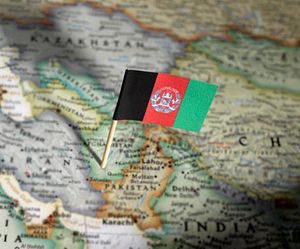Ending a six month stalemate over the results of its presidential run-off election, Afghanistan inaugurated Ashraf Ghani Ahmadzai as its new president on Monday. Ghani, a former finance minister, will succeed Hamid Karzai as the 13th president of Afghanistan. With Ghani’s inauguration, Afghanistan marks its first peaceful and democratic transfer of power between two governments. Alongside Ghani, Abdullah Abdullah was inaugurated as the country’s chief executive — a new role that was created as part of a U.S.-brokered unity government deal to defuse the electoral stalemate between the once rival presidential candidates.
Somewhat surprisingly, the inauguration ceremony lacked high-level representation from several powers, including the United States. For example, U.S. Secretary of State John Kerry, the man who helped broker the agreement that led to the unity government being formed, remained in Washington D.C. where he will receive Indian Prime Minister Narendra Modi who is currently on a state visit to the United States. White House advisor John Podesta led a 10-person U.S. delegation to the ceremony. Pakistani President Mamnoon Hussein and Indian Vice President Hamid Ansari were in attendance representing their countries. China sent its minister of human resources, Yin Weimin, to the inauguration. The absence of other notable regional leaders and foreign ministers was likely due to the ongoing United Nations General Assembly in New York City.
Meanwhile, Afghanistan’s Tolo News reports that the long-awaited signing of the Bilateral Security Agreement between the United States and Afghanistan will take place on Tuesday. The agreement was delayed for over a year as former Afghan President Hamid Karzai refused to sign it, arguing that it was a task for his successor. The agreement will form the legal basis for a residual U.S. troop presence in Afghanistan beyond the end of this year. The United States will keep on a troop contingent in the 8,000 to 10,000 range for limited counter-terrorism operations and to train Afghan security forces. U.S. Ambassador to Afghanistan James Cunningham will sign the BSA on behalf of the United States.
With Ghani’s inauguration, Hamid Karzai formally ended his near 13-year tenure as president of Afghanistan. Having originally been appointed by the international conference in Bonn in 2001, Karzai came to have a turbulent relationship with the United States in his final years in office. Prior to the inauguration, Karzai lambasted the United States and Pakistan in a farewell speech, warning his successors to be “extra cautious in relations with the U.S. and the West.” Karzai, nonetheless, was an important partner for the United States over the past decade in Afghanistan and played an important role in governing the country to the point that it was able to successfully stage a democratic transition. Under Afghanistan’s constitution, Karzai will be eligible to run for the office of president once again in 2019.
On Sunday night, before the inauguration, Karzai offered one final reflection on his time in office:
“When I first took charge of office, we did not have a flag, or a currency. We were the target of foreign agendas, we were homeless in our own country. I am proud to have worked toward rebuilding the nation and bringing [people] together to live in their shared homeland under one flag. I am proud to have worked toward rebuilding the nation that our ancestors had built. I am proud to see kids going to school all over the country and singing the national anthem with pride and joy every day.”
He admitted that his efforts at forging a lasting peace in Afghanistan had failed, but expressed optimism that his successors would fare better.

































